AWM137 2/2 - Historical information and general development of the RAAF Nursing Service - Letters and Histories for Press - Public Relations World War 2 - Part 4
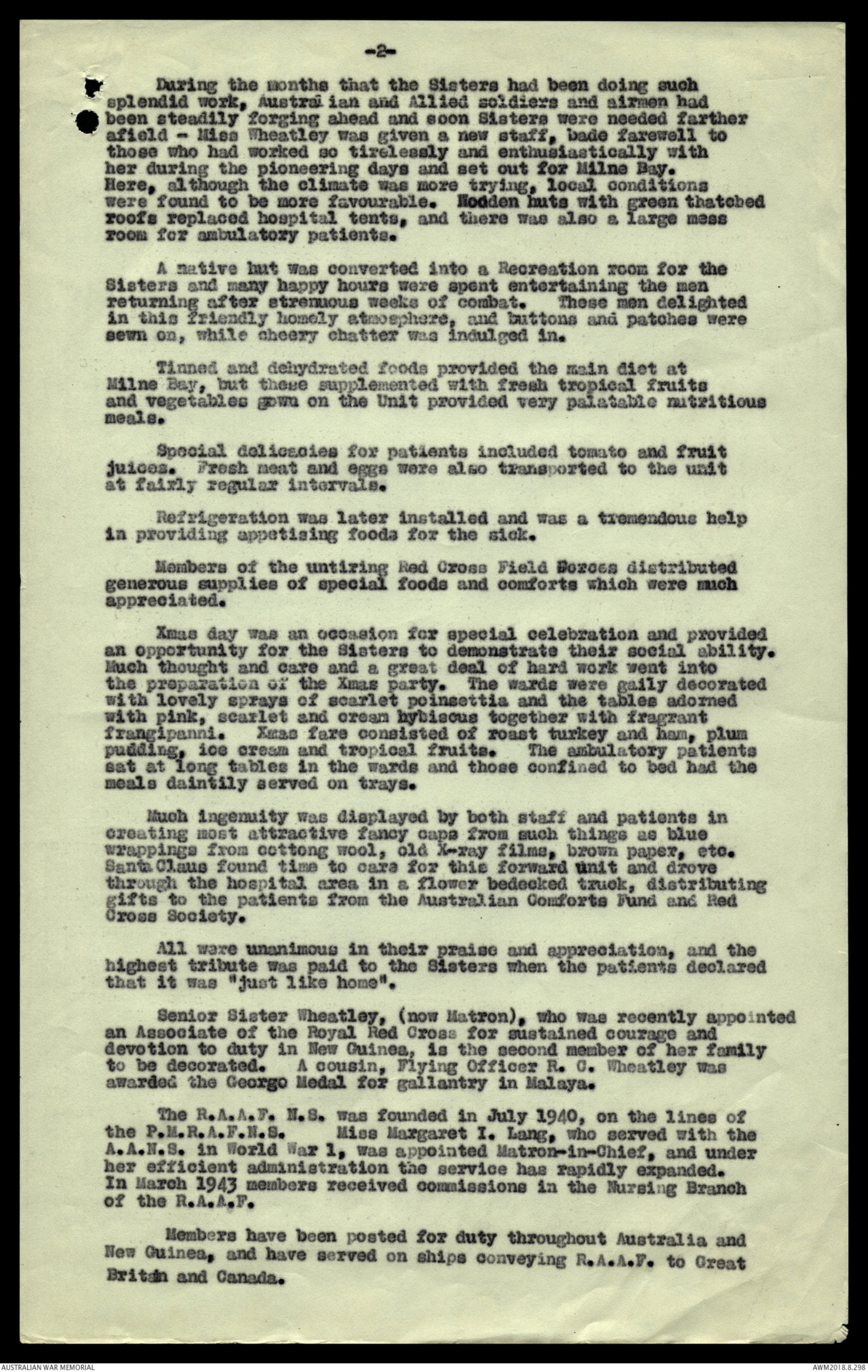
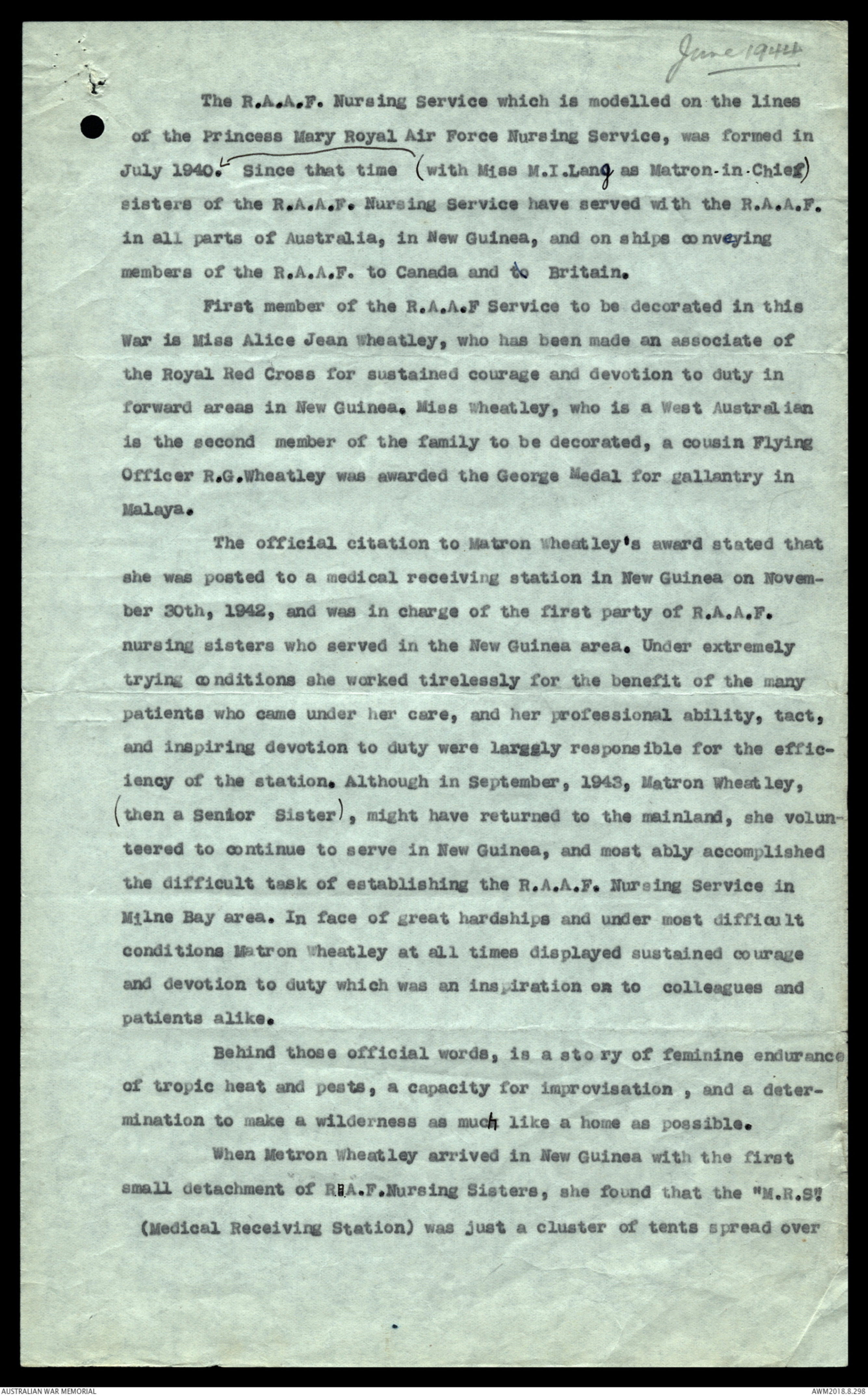
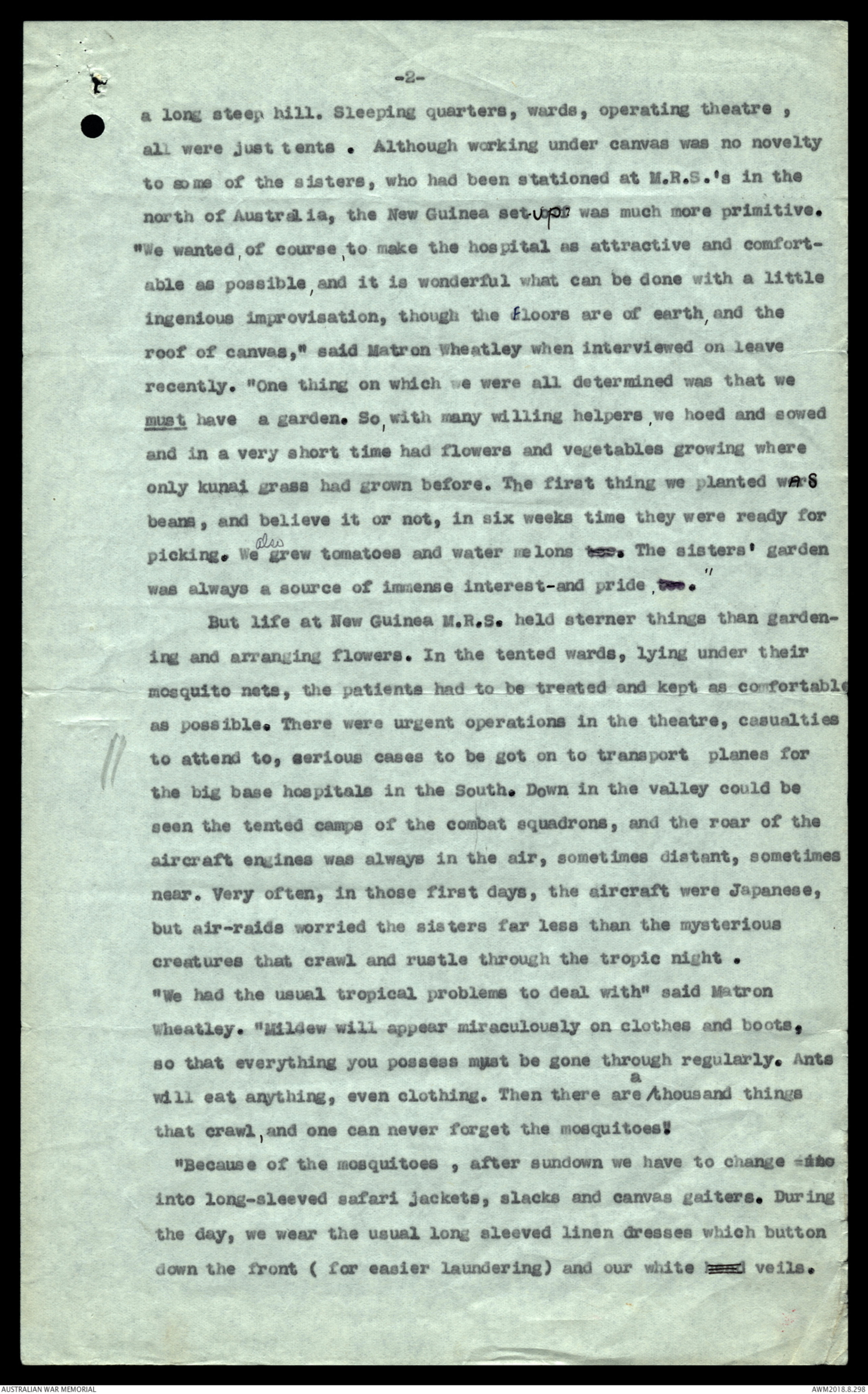
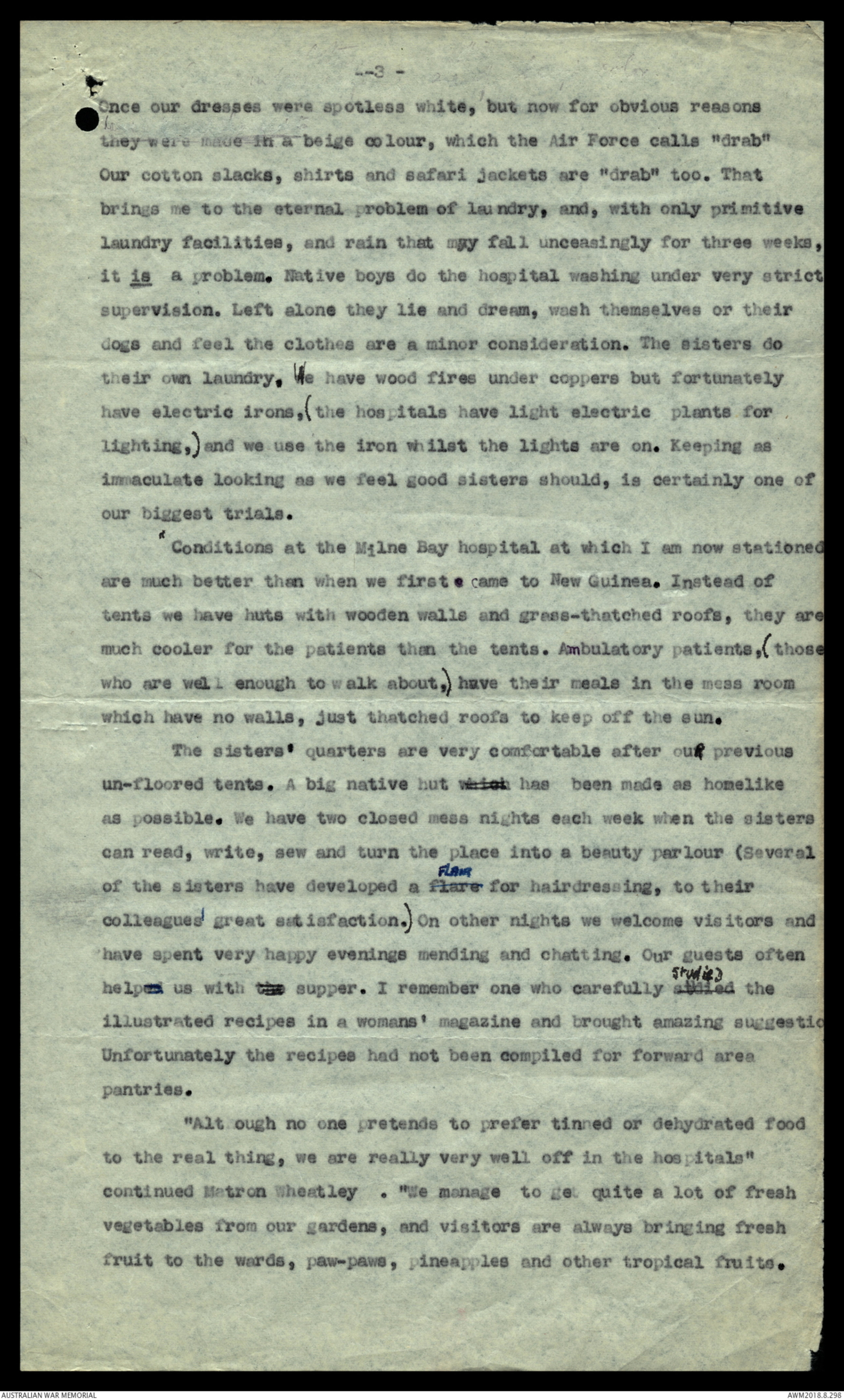
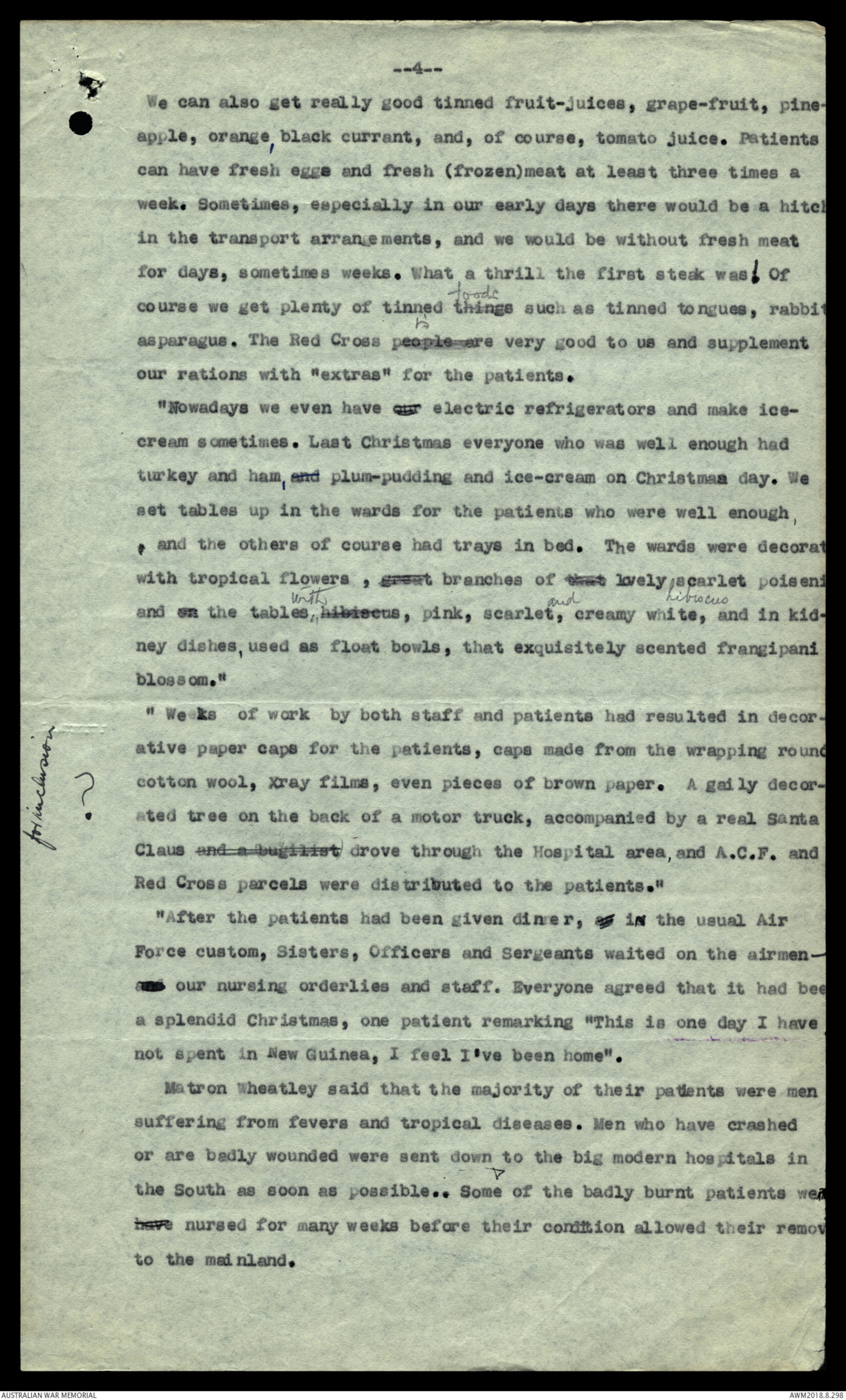
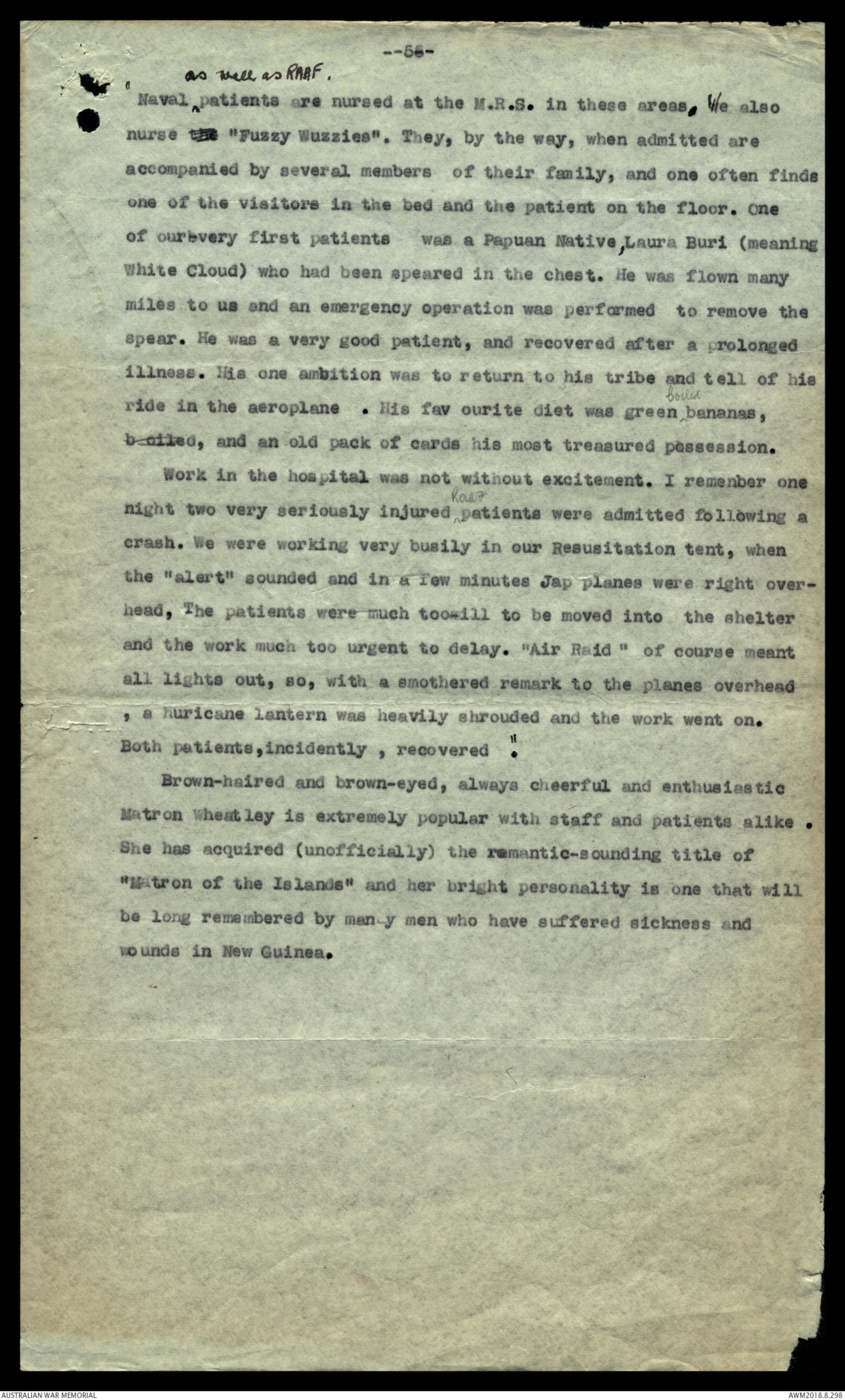
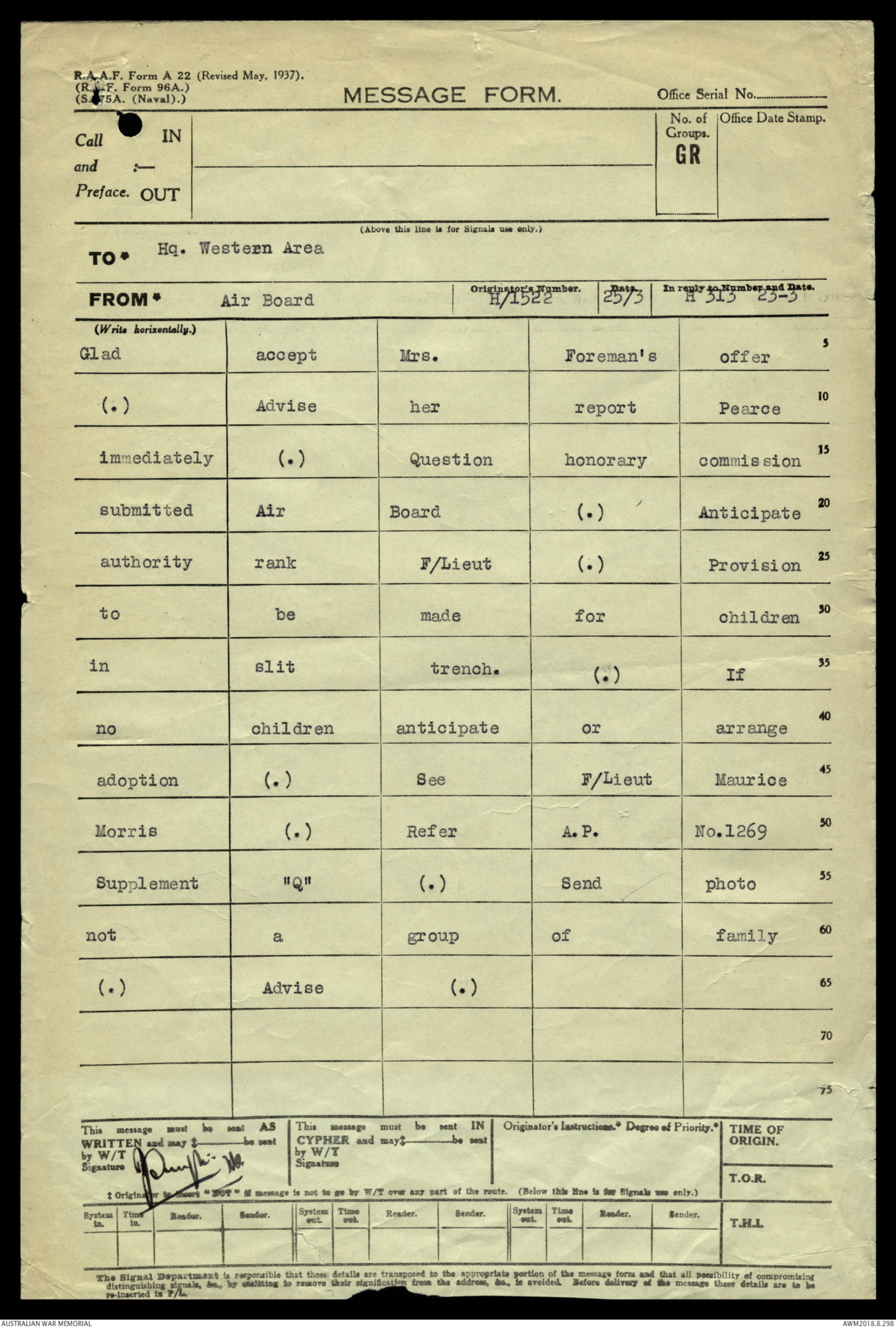
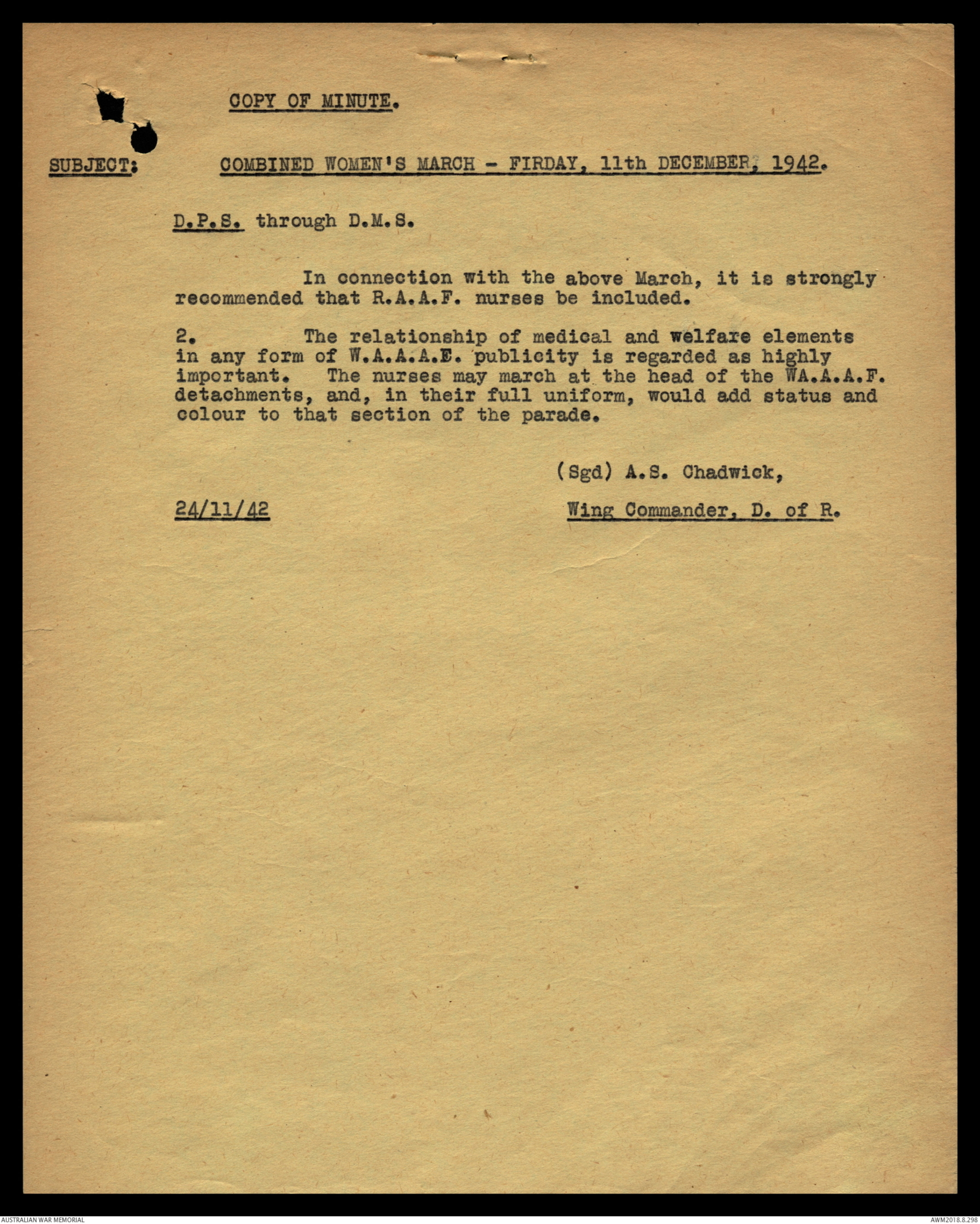
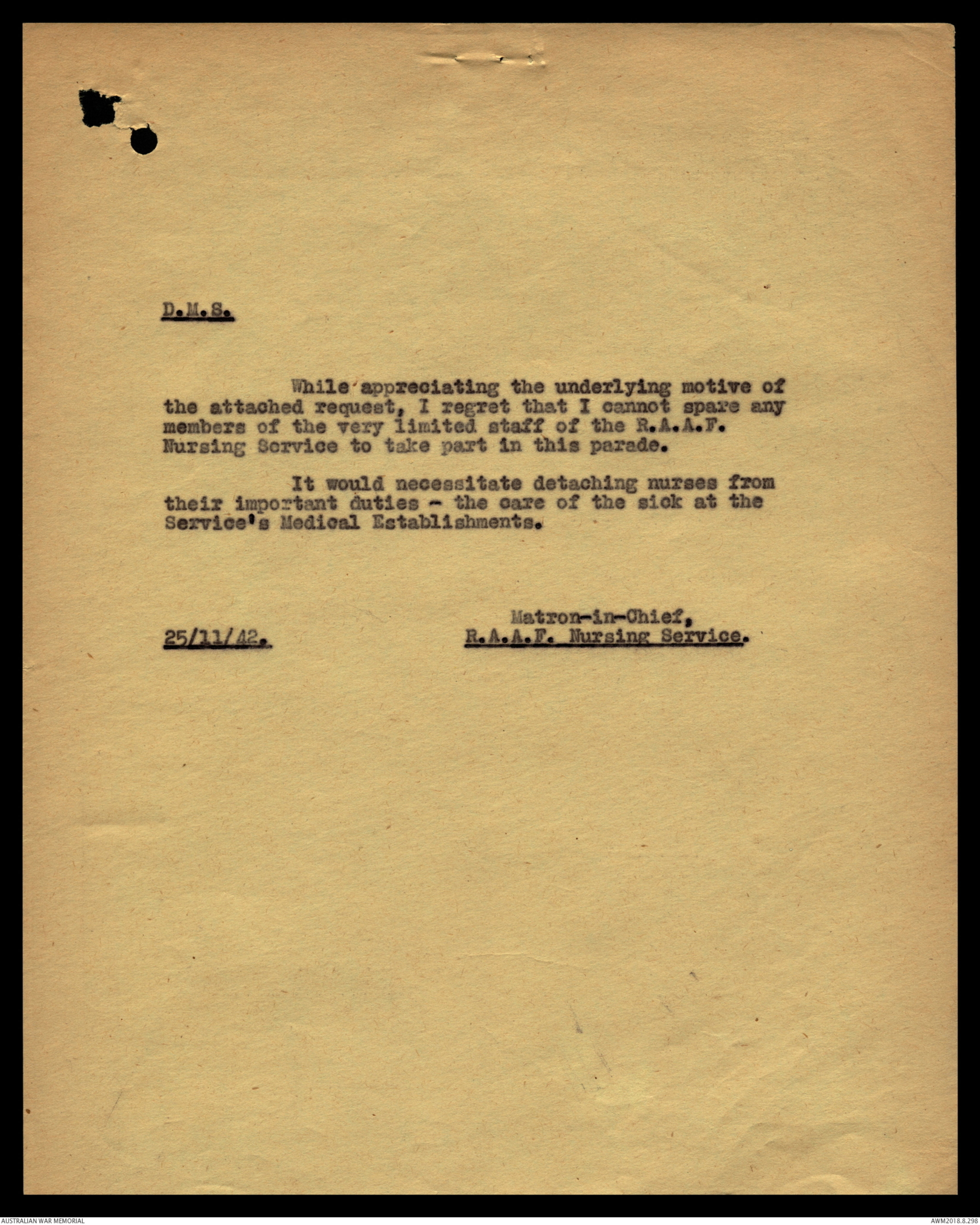
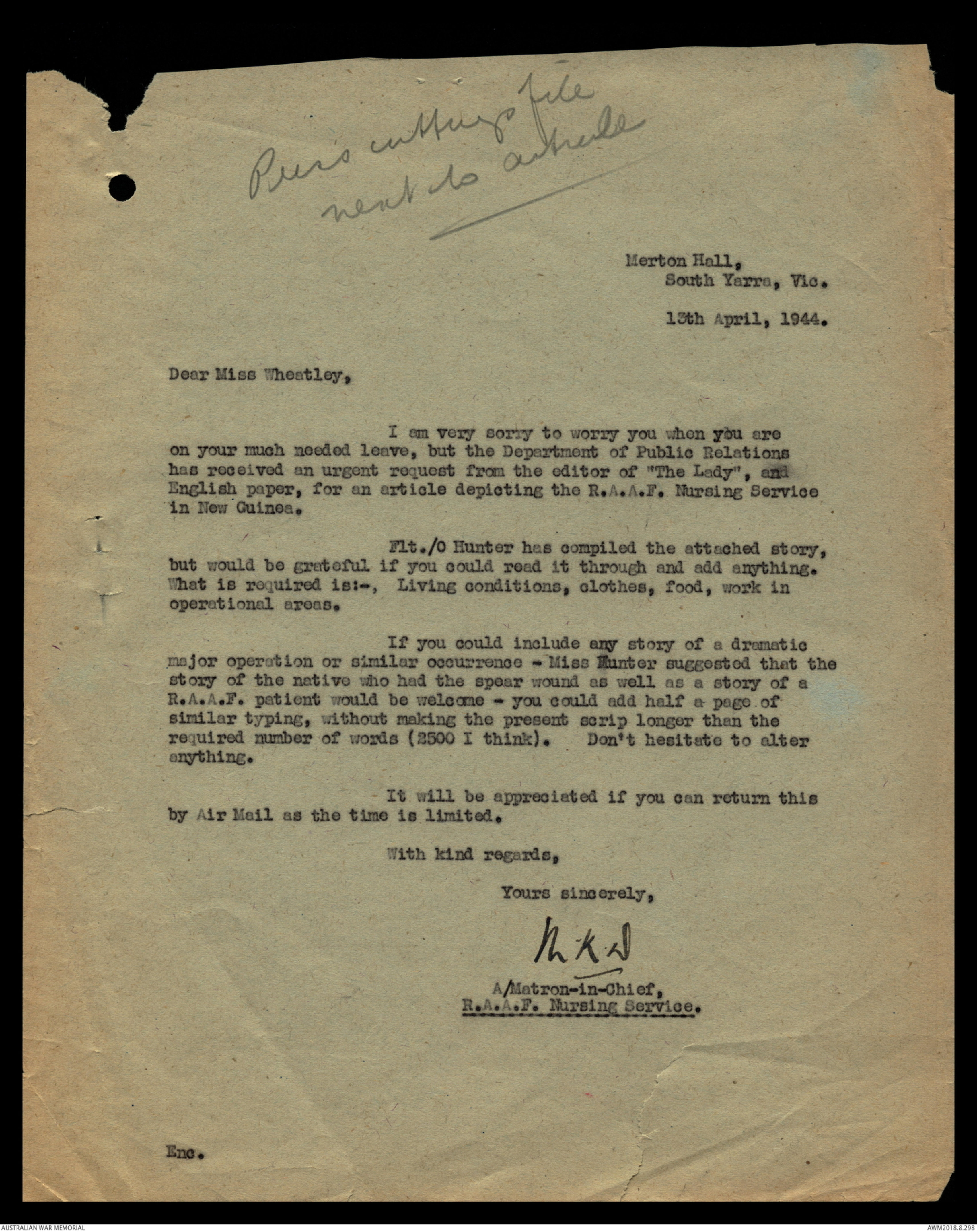
-2-
During the months that the Sisters had been doing such
splendid work, Australian and Allied soldiers and airmen had
been steadily forging ahead and soon Sisters were needed farther
afield - Miss Wheatley was given a new staff, bade farewell to
those who had worked so tirelessly and enthusiastically with
her during the pioneering days and set out for Milne Bay.
Here, although the climate was more trying, local conditions
were found to be more favourable. Wooden huts with green thatched
roofs replaced hospital tents, and there was also a large mess
room for ambulatory patients.
A native hut was converted into a Recreation room for the
Sisters and many happy hours were spent entertaining the men
returning after strenuous weeks of combat. These men delighted
in this friendly homely atmosphere, and buttons and patches were
sewn on, while cheery chatter was indulged in.
Tinned and dehydrated foods provided the main diet at
Milne Bay, but these supplemented with fresh tropical fruits
and vegetables grown on the Unit provided very palatable nutritious
meals.
Special delicacies for patients included tomato and fruit
juices. Fresh meat and eggs were also transported to the unit
at fairly regular intervals.
Refrigeration was later installed and was a tremendous help
in providing appetising foods for the sick.
Members of the untiring Red Cross Field Forces distributed
generous supplies of special foods and comforts which were much
appreciated.
Xmas day was an occasion for special celebration and provided
an opportunity for the Sisters to demonstrate their social ability.
Much thought and care and a great deal of hard work went into
the preparation of the Xmas party. The wards were gaily decorated
with lovely sprays of scarlet poinsettia and the tables adorned
with pink, scarlet and cream hybiscus together with fragrant
frangipanni. Xmas fare consisted of roast turkey and ham, plum
pudding, ice cream and tropical fruits. The ambulatory patients
sat at long tables in the wards and those confined to bed had the
meals daintily served on trays.
Much ingenuity was displayed by both staff and patients in
creating most attractive fancy caps from such things as blue
wrappings from cotton wool, old X-ray films, brown paper, etc.
Santa Claus found time to care for this forward unit and drove
through the hospital area in a flower bedecked truck, distributing
gifts to the patients from the Australian Comforts Fund and Red
Cross Society.
All were unanimous in their praise and appreciation, and the
highest tribute was paid to the Sisters when the patients declared
it was "just like home".
Senior Sister Wheatley, (now Matron), who was recently appointed
an Associate of the Royal Red Cross for sustained courage and
devotion to duty in New Guinea, is the second member of her family
to be decorated. A cousin, Flying Officer R. C. Wheatley was
awarded the George Medal for gallantry in Malaya.
The R.A.A.F. N.S. was founded in July 1940, on the lines of
the P.M.R.A.F.N.S. Miss Margaret I. Lang, who served with the
A.A.N.S. in World War 1, was appointed Matron-in-Chief, and under
her efficient administration the service has rapidly expanded.
In March 1943 members received commissions in the Nursing Branch
of the R.A.A.F.
Members have been posted for duty throughout Australia and
New Guinea, and have served on ships conveying R.A.A.F. to Great
Britain and Canada.
[*June 1944*]
The R.A.A.F. Nursing Service which is modelled on the lines
of the Princess Mary Royal Air Force Nursing Service, was formed in
July 1940. Since that time (with Miss M.I. Lang as Matron-in-Chief)
sisters of the R.A.A.F. Nursing Service have served with the R.A.A.F.
in all parts of Australia, in New Guinea, and on ships conveying
members of the R.A.A.F. to Canada and to Britain.
First member of the R.A.A.F Service to be decorated in this
War is Miss Alice Jean Wheatley, who has been made an associate of
the Royal Red Cross for sustained courage and devotion to duty in
forward areas in New Guinea. Miss Wheatley, who is a West Australian
is the second member of the family to be decorated, a cousin Flying
Officer R.G.Wheatley was awarded the George Medal for gallantry in
Malaya.
The official citation to Matron Wheatley's award stated that
she was posted to a medical receiving station in New Guinea on November
30th, 1942, and was in charge of the first party of R.A.A.F.
nursing sisters who served in the New Guinea area. Under extremely
trying conditions she worked tirelessly for the benefit of the many
patients who came under her care, and her professional ability, tact,
and inspiring devotion to duty were largely responsible for the efficiency
of the station. Although in September, 1943, Matron Wheatley,
(then a Senior Sister), might have returned to the mainland, she volunteered
to continue to serve in New Guinea, and most ably accomplished
the difficult task of establishing the R.A.A.F. Nursing Service in
Milne Bay area. In face of great hardships and under most difficult
conditions Matron Wheatley at all times displayed sustained courage
and devotion to duty which was an inspiration on to colleagues and
patients alike.
Behind those official words, is a story of feminine endurance
of tropic heat and pests, a capacity for improvisation, and a determination
to make a wilderness as much like a home as possible.
When Metron Wheatley arrived in New Guinea with the first
small detachment of R.A.A.F.Nursing Sisters, she found that the "M.R.S."
(Medical Receiving Station) was just a cluster of tents spread over
-2-
a long steep hill. Sleeping Quarters, wards, operating theatre,
all were just tents. Although working under canvas was no novelty
to some of the sisters, who had been stationed at M.R.S.'s in the
north of Australia, the New Guinea set up was much more primitive.
"We wanted, of course, to make the hospital as attractive and comfortable
as possible, and it is wonderful what can be done with a little
ingenious improvisation, though the floors are of earth, and the
roof of canvas," said Matron Wheatley when interviewed on leave
recently. "One thing on which we were all determined was that we
must have a garden. So, with many willing helpers, we hoed and sowed
and in a very short time had flowers and vegetables growing where
only kunai grass had grown before. The first thing we planted was
beans, and believe it or not, in six weeks time they were ready for
picking. We also grew tomatoes and water melons too. The sisters' garden
was always a source of immense interest-and pride, too."
But life at New Guinea M.R.S. held sterner things than gardening
and arranging flowers. In the tented wards, lying under their
mosquito nets, the patients had to be treated and kept as comfortable
as possible. There were urgent operations in the theatre, casualties
to attend to, serious cases to be got on to transport planes for
the big base hospitals in the South. Down in the valley could be
seen the tented camps of the combat squadrons, and the roar of the
aircraft engines was always in the air, sometimes distant, sometimes
near. Very often, in those first days, the aircraft were Japanese,
but air-raids worried the sisters far less than the mysterious
creatures that crawl and rustle through the tropic night.
"We had the usual tropical problems to deal with" said Matron
Wheatley. "Mildew will appear miraculously on clothes and boots,
so that everything you possess must be gone through regularly. Ants
will eat anything, even clothing. Then there are ^a thousand things
that crawl, and one can never forget the mosquitoes."
"Because of the mosquitoes, after sundown we have to change the
into long-sleeved safari jackets, slacks and canvas gaiters. During
the day, we wear the usual long sleeved linen dresses which button
down the front ( for easier laundering) and our white head veils.
--3-
Once Our dresses were spotless white, but now for obvious reasons
they were made in a beige colour, which the Air Force calls "drab"
Our cotton slacks, shirts and safari jackets are "drab" too. That
brings me to the eternal problem of laundry, and, with only primitive
laundry facilities, and rain that may fall unceasingly for three weeks,
it is a problem. Native boys do the hospital washing under very strict
supervision. Left alone they lie and dream, wash themselves or their
dogs and feel the clothes are a minor consideration. The sisters do
their own laundry, We have wood fires under coppers but fortunately
have electric irons, (the hospitals have light electric plants for
lighting,)and we use the iron whilst the lights are on. Keeping as
immaculate looking as we feel good sisters should, is certainly one of
our biggest trials.
Conditions at the Milne Bay hospital at which I am now stationed
are much better than when we first came to New Guinea. Instead of
tents we have huts with wooden walls and grass-thatched roofs, they are
much cooler for the patients than the tents. Ambulatory patients, (those
who are well enough to walk about,) have their meals in the mess room
which have no walls, just thatched roofs to keep off the sun.
The sisters' quarters are very comfortable after our previous
un-floored tents. A big native hut which has been made as homelike
as possible. We have two closed mess nights each week when the sisters
can read, write, sew and turn the place into a beauty parlour (Several
of the sisters have developed a flare flair for hairdressing, to their
colleagues' great satisfaction.) On other nights we welcome visitors and
have spent very happy evenings mending and chatting. Our guests often
helped us with the supper. I remember one who carefully sudied studied the
illustrated recipes in a womans' magazine and brought amazing [[suggestions?]]
Unfortunately the recipes had not been compiled for forward area
pantries.
"Although no one pretends to prefer tinned or dehydrated food
to the real thing, we are really very well off in the hospitals"
continued Matron Wheatley ."We manage to get quite a lot of fresh
vegetables from our gardens, and visitors are always bringing fresh
fruit to the wards, paw-paws, pineapples and other tropical fruits.
-4-
We can also get really good tinned fruit-juices, grape-fruit, pineapple,
orange, black currant, and, of course, tomato juice. Patients
can have fresh eggs and fresh (frozen)meat at least three times a
week. Sometimes, especially in our early days there would be a hitch
in the transport arrangements, and we would be without fresh meat
for days, sometimes weeks. What a thrill the first steak was. Of
course we get plenty of tinned things food such as tinned tongues, rabbit
asparagus. The Red Cross people are is very good to us and supplement
our rations with "extras" for the patients.
"Nowadays we even have our electric refrigerators and make icecream
sometimes. Last Christmas everyone who was well enough had
turkey and ham, and plum-pudding and ice-cream on Christmas day. We
set tables up in the wards for the patients who were well enough,
and the others of course had trays in bed. The wards were [[decorated?]]
with tropical flowers, great branches of that lovely scarlet poiseni
and on the tables, ^with hibiscus, pink, scarlet, ^and creamy white, ^hibiscus and in kidney
dishes, used as float bowls, that exquisitely scented frangipani
blossom."
[*for inclusion ?*]
"Weeks of work by both staff and patients had resulted in decorative
paper caps for the patients, caps made from the wrapping round
cotton wool, Xray film, even pieces of brown paper. A gaily decorated
tree on the back of a motor truck, accompanied by a real Santa
Clause and a bugilist drove through the Hospital area, and A.C.F. and
Red Cross parcels were distributed to patients."
"After the patients had been given dinner, as in the usual Air
Force custom, Sisters, Officers and Sergeants waited on the airmen-and our nursing orderlies and staff. Everyone agreed that it had [[been?]]
a splendid Christmas, one patient remarking "This is one day I have
not spent in New Guinea, I feel I've been home".
Matron Wheatley said that the majority of their patients were men
suffering from fevers and tropical diseases. Men who have crashed
or are badly wounded were sent down to the big modern hospitals in
the South as soon as possible.. Some of the badly burnt patients werehave nursed for many weeks before their condition allowed their [[removal?]]
to the mainland.
--56-
Naval ^as well as RAAF patients are nursed at the M.R.S. in these areas. We also
nurse the "Fuzzy Wuzzies". They, by the way, when admitted are
accompanied by several members of their family, and one often finds
one of the visitors in the bed and the patient on the floor. One
of ourbvery first patients was a Papuan Native, Laura Buri (meaning
White Cloud) who had been speared in the chest. He was flown many
miles to us and an emergency operation was performed to remove the
spear. He was a very good patient, and recovered after a prolonged
illness. His one ambition was to return to his tribe and tell of his
ride in the aeroplane . His favourite diet was green ^boiled bananas,b oiled, and an old pack of cards his most treasured possession.
Work in the hospital was not without excitement. I remember one
night two very seriously injured ^RAAF patients were admitted following a
crash. We were working very busily in our Resusitation tent, when
the "alert" sounded and in a few minutes Jap planes were right overhead,
The patients were much toowill to be moved into the shelter
and the work much too urgent to delay. "Air Raid " of course meant
all lights out, so, with a smothered remark to the planes overhead
, a huricane lantern was heavily shrouded and the work went on.
Both patients,incidently recovered ".
Brown-haired and brown-eyed, always cheerful and enthusiastic
Matron Wheatley is extremely popular with staff and patients alike.
She has acquired (unofficially) the romantic-sounding title of
"Matron of the Islands" and her bright personality is one that will
be long remembered by many men who have suffered sickness and
wounds in New Guinea.
To* Hq. Western Area
From* Air Board H/1522 25/3 H313 23-3
| Glad | accept | Mrs. | Foreman's | offer |
| (.) |
Advise
|
her
|
report
|
Pearce |
| immediately | (,) | Question | honorary | commission |
| submitted | Air | Board | (.) | Anticipate |
| authority | rank | F/Lieut | (.) | Provision |
| to | be | made | for | children |
| in | slit | trench. | (.) | If |
| no | children | anticipate | or | arrange |
| adoption | (.) | See | F/Lieut | Maurice |
| Morris | (.) | Refer | A.P. | No.1269 |
| Supplement | "Q" | (.) | Send | photo |
| not | a | group | of | family |
| (.) | Advise | (.) |
Signature [[?]]
COPY OF MINUTE.
SUBJECT: COMBINED WOMEN'S MARCH - FIRDAY, 11th DECEMBER; 1942.
D.P.S. through D.M.S.
In connection with the above March, it is strongly
recommended that R.A.A.F. nurses be included.
2. The relationship of medical and welfare elements
in any form of W.A.A.A.F. publicity is regarded as highly
important. The nurses may march at the head of the W.A.A.A.F.
detachments, and, in their full uniform, would add status and
colour to that section of the parade.
(Sgd) A.S. Chadwick,
24/11/42 Wing Commander, D. of R.
D.M.S
While appreciating the underlying motive of
the attached request, I regret that I cannot spare any
members of the very limited staff of the R.A.A.F.
Nursing Service to take part in this parade.
It would necessitate detaching nurses from
their important duties - the care of the sick at the
Service's Medical Establishments.
Matron-in-Chief,
25/11/42. R.A.A.F. Nursing Service.
[*Place cuttings file
next to article*]
Merton Hall,
South Yarra, Vic.
13th April, 1944.
Dear Miss Wheatley,
I am very sorry to worry you when you are
on your much needed leave, but the Department of Public Relations
has received an urgent request from the editor of "The Lady", and
English paper, for an article depicting the R.A.A.F. Nursing Service
in New Guinea.
Flt./O Hunter has compiled the attached story,
but would be grateful if you could read it through and add anything.
What is required is:-, Living conditions, clothes, food, work in
operational areas.
If you could include any story of a dramatic
major operation or similar occurrence - Miss Hunter suggested that the
story of the native who had the spear wound as well as a story of a
R.A.A.F. patient would be welcome - you could add half a page of
similar typing, without making the present scrip longer than the
required number of words (2500 I think). Don't hesitate to alter
anything.
It will be appreciated if you can return this
by Air Mail as the time is limited.
With kind regards,
Yours sincerely,
MKW
A/Matron-in-Chief,
R.A.A.F. Nursing Service.
Enc.
 Kate Benn
Kate BennThis transcription item is now locked to you for editing. To release the lock either Save your changes or Cancel.
This lock will be automatically released after 60 minutes of inactivity.